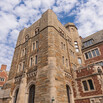Professor John Langbein Receives Simeon E. Baldwin Award
Yale Law School’s Center for the Study of Corporate Law has awarded its 2015 Simeon E. Baldwin Award to John H. Langbein, Sterling Professor of Law and Legal History. Professor Langbein is a preeminent legal historian and a leading American authority on trust, probate, pension, and investment law.
At the award presentation this spring, Sterling Professor of Law and Director, Yale Law School Center for the Study of Corporate Law, Roberta Romano ’80 noted, “John Langbein changed the conversation in investment law, by introducing modern finance theory — the portfolio theory of investments — into trust law, in his 1976 article, coauthored with Richard Posner, ‘Market Funds and Trust Investment Law.’ The article was a veritable intellectual earthquake. It caused a fundamental reorientation in the understanding of fiduciary obligations.”
John Witt ’99, the Allen H. Duffy Class of 1960 Professor of Law, also spoke at the event regarding Langbein’s scholarship as a historian, noting, “It requires genius as a writer to be a great teacher of writing, at least at the highest levels. For more than forty years, John has been writing forcefully, brilliantly, and with the indefatigable energies that only the very best scholars manage to bring to their work. … Most recently John has published an astounding volume, a big textbook titled History of the Common Law, a book that represents the culmination of the History of the Common Law course he has taught so influentially for decades now. Co-authored with two of his most distinguished former students, the book has created a landmark for the legacy John has built in the world of legal education and legal scholarship.”
The Simeon E. Baldwin Award was established in 2007 and is presented by the Center to a Yale Law School graduate or faculty member in recognition of distinguished achievement in law and business. Simeon Baldwin, both a student and faculty member of the Law School, was the leading railroad lawyer of his day and was responsible for establishing the Law School’s interdisciplinary tradition. He was also governor and chief justice of the Supreme Court of Connecticut, and a founder and president of numerous professional associations.


